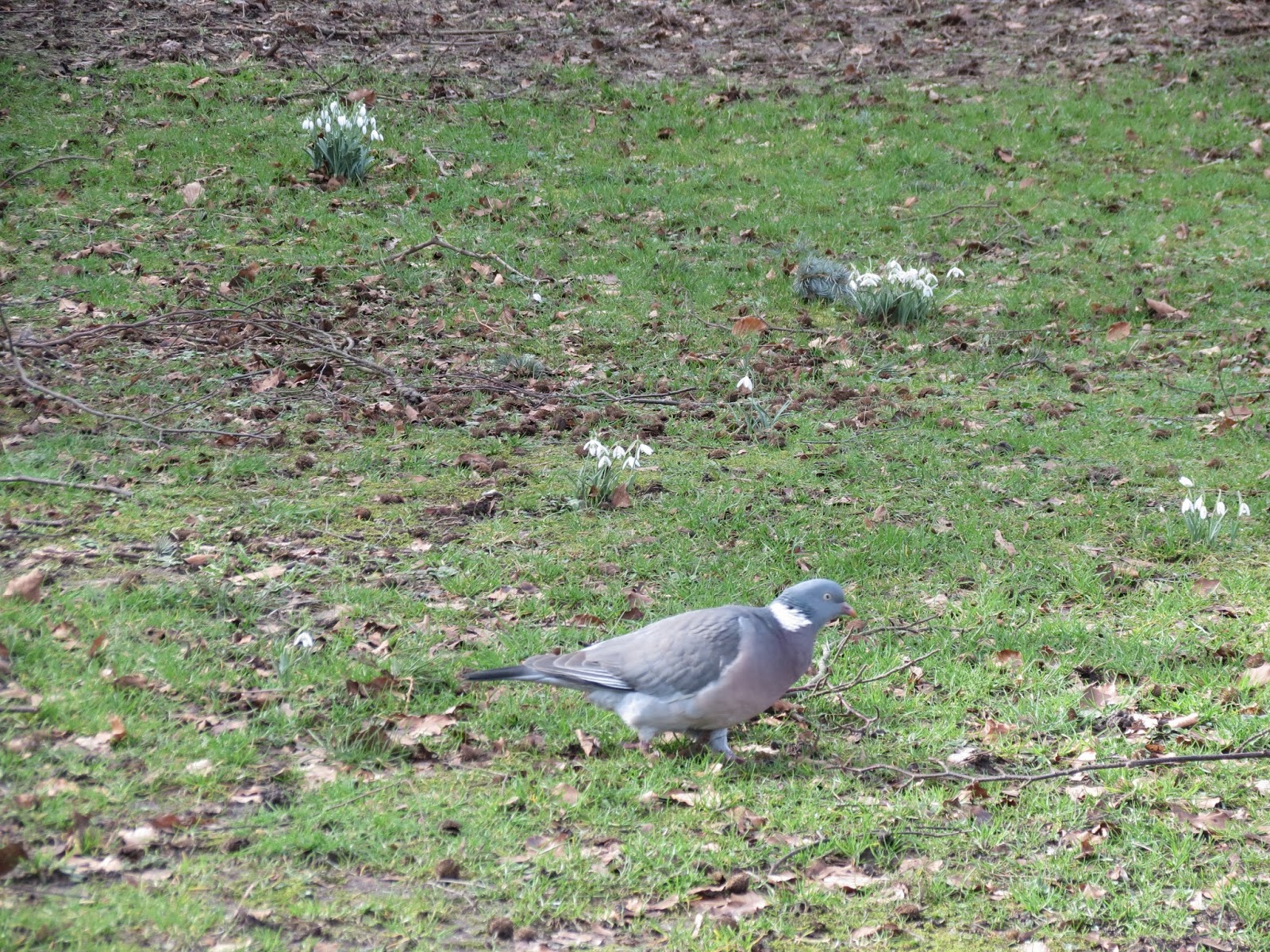FRIDAY 21 FEBRUARY
My earliest-ever 'spring migrant' GARGANEYS
in the UK
A mild slipstream running up from the south
brought temperatures of up to 12 degrees C but also long periods of rain. It
also brought with it a number of spring migrants, including Oystercatchers and
the first Sand Martins of the year......
At CHAFFINCH HOUSE (LITTLE CHALFONT), a
female SISKIN on the Nyger was the first of the year in the garden -
accompanying 3 Goldfinches...
At CHESHAM FISHING LAKES, also new-in were a
pair of GREAT CRESTED GREBES - local birder Chris Pontin finding them earlier.
Also there were 14 Atlantic Canada Geese (already paired up and claiming
territory on the islands), 8 Mallard, 13 Tufted Duck, 4 Moorhen, 8 Coot and 73
Black-headed Gulls, whilst along the riverside walk, COMMON KINGFISHER, 2
Long-tailed Tits, 2 singing male Robins, 6 singing male Wrens, 6 Dunnock, 4
Great Tit, 2 Blue Tit, 2 Stock Dove, 1 Woodpigeon, Carrion Crow, 2 singing male
Goldcrest, 1 Chaffinch and Red Kite were all encountered.
Great Crested Grebes back and in fine fettle
A lot of Robins in full song...
Long-tailed Tits paired up and already gathering nest material...
...and my best Woodpigeon shots to date
In CHESHAM LOWNDES PARK, the February
inventory included 1 Mute Swan, 22 Atlantic Canada Geese, 18 Mallard, the 8
resident Muscovy Ducks and 2 Moorhen, whilst the 44 Black-headed Gulls included
4 ringed individuals amongst them, including last year's ST220111 from Finland
(ringed as anestling in Vaasa on 25th June 2003) and 3727833 from The
Netherlands (ringed as a nestling in Friesland on 3rd June 2011). A Goldcrest
was singing from a Yew tree.
Atlantic Canada Geese having a rest...
...and not the prettiest of wildfowl - domesticated Muscovy Duck
Woodpigeons amongst the Snowdrops
...and of just 44 Black-headed Gulls present
...no less than 4 adults were ringed
A new Mute Swan on site
...and Western Jackdaws all paired-up
Bury Lake at its finest - and full
BURY LAKE in CHESHAM was the deepest I have
seen it in a very long time and consequently held waterbirds, including 6 Coot,
2 Moorhen, 12 Mallard, 9 Atlantic Canada Geese and 4 Tufted Ducks (3 drakes and
a female) - the latter my first-ever at the site. Across the road, the cereal
crop already held a pair of displaying LAPWING, as well as 85+ Woodpigeon, 6
Rook, 45 Jackdaw and 28 Rabbits. A pair of Long-tailed Tits were in the
hedgerow, while a female Common Kestrel was hovering above the
road.
Tufted Ducks on Bury Lake - my first record there
Coots and Canada Geese on floodwater opposite the lake
...and Lapwings already back on territory
Continuing along the PEDNOR ROAD, the HORSE
PADDOCKS held 2 Red Kite, a further 160 Woodpigeons, numerous Jackdaws, 8 Common
Magpies, 18 Rook and a pair of Mistle Thrushes, with both Robin and Great Tit by
the farm buildings.
At the far end of PEDNOR BOTTOM, where the
road bends sharply to the left, a lot of Red Kite activity, with sticks being
picked up as well as grass tufts, presumably indicating nest building. A couple
of Common Buzzards were loudly displaying, whilst a Dunnock was in full song and
a male Linnet flew over - my first in the Recording Area this year.
Lots of Red Kite activity
gathering grass tufts from the ground
....and Common Buzzards 'mewing' loudly and displaying
In the grounds of DRYDELL HOUSE, 2 Mallard,
Dunnock, Robin and a tight-knit flock of 8 Great Tits were all noted, whilst
around LITTLE PEDNOR FARM, 2 Common Kestrels and a Carrion Crow were sighted. At
PEDNOR CHASE, 8 Woodpigeon, 8 Goldfinch and another Robin in full song and at
PEDNOR RIDGE, another Common Kestrel, more Red Kites, Common Blackbird and
another Robin. The horse paddocks opposite CHERRY TREE FARM held 2 Common
Magpies and 2 Pied Wagtails, with a further singing Robin at the entrance
gates.
In the grass fields opposite ANNIE BAILEY'S
RESTAURANT near HYDE END, a cock Common Pheasant, 40 Black-headed Gulls and 25
Common Gulls, while DEEP MILL LANE POND held 2 Little Grebes, 5 Moorhen, 4 Coot,
3 Woodpigeon and a Song Thrush. The MISBOURNE by LITTLE MISSENDEN held 6
Mallard, 6 Moorhen and 4 Coot, with the hamlet itself adding 15 Jackdaw, 6
Robin, several Woodpigeon, Common Blackbird and Chaffinch.
SHARDELOES LAKE was fairly quiet, although
another birdwatcher had seen the Shoveler pair I had found on my last visit. The
rollcall included 8 Little Grebe, just 44 Coot, 4 Moorhen, 34 Atlantic Canada
Geese, the 3 resident Mute Swans, 6 Gadwall and 15 Tufted Duck, as well as cock
Common Pheasant, 3 Blue Tit, Great Tit (in full song), 2 Long-tailed Tit, Wren,
Green Woodpecker, 4 Red Kite, 2 Common Buzzard, just 2 Black-headed Gulls, Grey
Wagtail, Common Blackbird and 4 Fieldfares.
A Song Thrush crossed the road in WINCHMORE
HILL, whilst PENN VILLAGE POND yielded counts of 38 Mallard, 2 Moorhen and 4
Black-headed Gulls.
Arriving in PENN WOOD at around 1500 hours,
I was immediately greeted by a stag Reeve's Muntjac and a singing male Great
Tit. Walking up towards the Holly Roost Site added Green Woodpecker, Wren and
Coal Tit, with the Greenfinch gathering in better fettle than of late and
totalling 56 birds. At least 12 BRAMBLING were with them also. Up at the Penna
monument, 2 Bullfinches and a singing male Mistle Thrush were noted, while the
eventual peak of BRAMBLINGS in the Larch pre-roost trees was 72 birds, along
with around 55 Chaffinch.
Reeve's Muntjac
The Greenfinch pre-roost
....and the Holly trees the Greenfinches actually roost in
A selection of Bramblings present...
....and their pre-roost Larches
Blue Tit
More Bramblings
The devastation - Rhododendron scrub extensively cleared (the Bramblings roost-site)
Just as I was counting the Bramblings, I got
a delayed text message from David Bilcock informing me of 2 GARGANEY at COLLEGE
LAKE BBOWT. It related to a message some two hours ago and after confirming with
Dave, I immediately rushed over to the reserve arriving just prior to 5pm!
Luckily, quite a few BBOWT staff were still on site, thus I rushed down to the
west end and located the GARGANEY PAIR roosting in the tall sedge at the far
left hand end of the left island. These were the earliest migrant Garganey I
have seen in Britain by a long shot - the previous earliest Bucks Garganey being
on 9th March - a mega record and proof of how mild this winter has been. The
main marsh held quite a few wildfowl as well as a party of 23 COMMON SNIPE. A
brilliant end to the day.
Very distant, fading light but a record shot of my earliest-ever migrant Garganeys
(look left of Moorhen & Wigeon)
























































































No comments:
Post a Comment